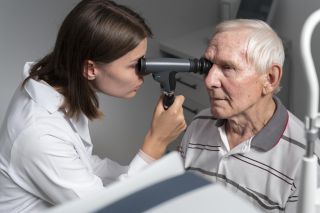Dementia
What the Eyes Tell Us About the Brain
... and why protecting one keeps the other healthy.
Updated June 19, 2023 Reviewed by Tyler Woods
Key points
- Eye movement patterns during real world tasks can depict underlying mental strategies.
- Correcting visual impairments is an easy way to reduce your risk of dementia.
- Common sense tips can simultaneously protect your eyes and your brain.

Thanks to Shakespeare, most people are familiar with the eyes being attributed as “the windows to your soul.” It turns out that your eyes are also windows into some of your cognitive processes and your brain health.
Where You Look Tells Scientists How You Think
Research that my colleagues and I conducted at the Stanford VA Aviation Safety Lab and the Naval Postgraduate School indicates that our eye movements can tell us a lot about underlying cognitive strategies, especially for tasks like driving or flying a plane.
We were able to distinguish novice and expert pilots simply based on their visual scan patterns while they “flew” in a flight simulator. Experts look where they need to look at exactly the moment when they need to make a decision. Visual scan patterns of novices are messy, indicating that they often don’t know what visual cues to use to help make decisions. We also were able to determine the strategies pilots used in confirming their current location and what features of the runway pilots relied on to decide whether or not to land a plane under foggy conditions.
In these studies, eye movements were measured while participants performed complex, real-world tasks. However, even basic eye movements, such as following a dot across a screen, can inform us of the current status of our brain health.
Dorion Liston, a vision scientist and the CEO of neuroFit, explains that “the ability to process and perceive visual motion can be read out in your eye movements. On the one hand, the brain circuits that process motion are subject to disruption due to neuropathological conditions, such as traumatic brain injury or mild cognitive impairment. On the more positive side, eye movements also can inform when brain circuits are working well. Similar to a muscle, the brain circuitry can strengthen over time.”
Vision Loss Is Linked to Cognitive Impairment
Unfortunately, visual impairment increases the risk of cognitive decline and dementia for older adults. One study concluded that poor vision may have led to up to 100,000 cases of dementia in the United States.
Varshini Varadaraj, a research associate at John Hopkins Disability Health Research Center, and her colleagues recently conducted a seven-year longitudinal study that found “worse vision (measured in three different ways) was associated with more rapid cognitive decline. Specifically, worse visual acuity and depth perception impairment were associated with greater declines in language and memory, whereas worse contrast sensitivity was associated with declines in language, memory, attention, and visuospatial ability. These findings suggest that patterns of cognitive decline in older adults may differ by the type of vision loss they may experience, with impaired contrast sensitivity being associated with a wider range of cognitive decrement.”
Why is Vision Loss Associated with Cognitive Impairment?
According to Varadaraj, there are several possible reasons why visual impairment is associated with cognitive decline. “The ‘common cause pathway’ or having a shared pathology underlying both vision and cognitive impairments," such as nerve or vascular disease, is a possibility.
Alternatively, the “sensory loss consequence pathway,” where vision loss may be associated with cognitive decline through conditions known to affect cognition, such as depression, social isolation, decreased engagement in cognitively stimulating activities, and increased cognitive load due to the greater dedication of cognitive resources to visual processing, may be another. "In truth, a combination of these mechanisms likely contributes to the greater cognitive decline noted in older adults with vision loss.”
Common Sense Tips That Help Your Eyes and Your Brain
Happily, several of the recommendations from the National Eye Institute designed for eye health also help out your brain:
- See your ophthalmologist regularly. Correcting poor vision with glasses or getting cataract surgery reduces the risk of cognitive impairment. Regular eye visits also can help prevent diabetic eye disease through early detection. A recent study concluded that one of the easiest ways to reduce your risk of dementia is by correcting poor vision.
- Eat a healthy diet. The American Academy of Ophthalmology recommends regularly consuming green leafy vegetables, fish, and fruit to provide the nutrients that your eyes need. By including these foods in your diet, you are also protecting your brain. For example, the MIND diet is aligned with the American Academy of Ophthalmology dietary recommendations and has been shown to slow down the rate of cognitive decline and reduce your risk for dementia.
- Exercise. Cardiovascular exercise can help manage chronic health conditions, such as diabetes. Diabetes can damage the vessels in the retina, leading to visual impairment and, in some cases, even blindness. Diabetes also increases the risk of dementia. Early detection of diabetes and management of blood glucose can help reduce your risk for both vision problems and cognitive impairment. Even if you don’t have diabetes, studies have found that regular exercise can help maintain good cognitive function over time.

Telma Barseghian, O.D. of Blink Optometry, agrees. “As part of a healthy lifestyle which includes diet and exercise, annual comprehensive eye examinations are also very important. In fact, the eyes are one of the few organs which can be examined non-invasively, and yet they provide a deep understanding of a patient's overall health. For example, many systemic conditions can manifest in the eyes even before patients are aware they have them. These include hypertension, diabetes, high cholesterol, heart disease, and even some types of cancer.”
Summary
Our eyes tell us much more than just where we are looking. They provide valuable insights into our thoughts and underlying brain health. As Barseghian puts it, “Our eyes are part of our body, so when we improve our overall health, our eyes reap the benefits as well.” The next time you visit your eye doctor or go for a brisk walk, give yourself a pat on the back for doing something that’s good for your eyes and for your brain.
Facebook/LinkedIn image: Grustock/Shutterstock
References
Dhana K, James BD, Agarwal P, Aggarwal NT, Cherian LJ, Leurgans SE, Barnes LL, Bennett DA, Schneider JA. (2021). MIND Diet, common brain pathologies, and cognition in community-dwelling older adults. Journal of Alzheimer’s Disease, 83(2):683-692.
Fassier P, Kang JH, Lee IM, Grodstein F, Vercambre MN. (2022). Vigorous physical activity and cognitive trajectory later in life: Prospective association and interaction by Apolipoprotein E e4 in the Nurses' Health Study. Journals of Gerontology Series A: Biological Sciences and Medical Science, 1;77(4):817-825.
Han SB, Yang HK, Hyon JY. (2018). Influence of diabetes mellitus on anterior segment of the eye. Clinical Interventions of Aging, 27;14:53-63.
Morris MC, Tangney CC, Wang Y, Sacks FM, Barnes LL, Bennett DA, Aggarwal NT. (2015). MIND diet slows cognitive decline with aging. Alzheimer’s & Dementia, 11(9):1015-22.
National Institute on Aging. (November 10, 2022). Vision impairment is associated with as many as 100,000 U.S. dementia cases. https://www.nia.nih.gov/news/vision-impairment-associated-many-100000-u-s-dementia-cases
National Institute of Diabetes and Digestive and Kidney Diseases. Diabetic eye disease. Retrieved from https://www.niddk.nih.gov/health-information/diabetes/overview/preventing-problems/diabetic-eye-disease
Sullivan J, Yang JH, Day M, Kennedy Q. (2011) Training simulation for helicopter navigation by characterizing visual scan patterns. Aviation Space and Environmental Medicine, 82(9):871-8.
Varadaraj V, Munoz B, Deal JA, et al. (2021). Association of vision impairment with cognitive decline across multiple domains in older adults. JAMA Network Open, 4(7):e2117416.
Yang JH, Kennedy Q, Sullivan J, Fricker RD (2013). Jr. Pilot performance: assessing how scan patterns & navigational assessments vary by flight expertise. Aviation Space and Environmental Medicine, 84(2):116-24.




